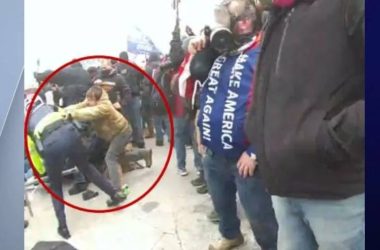Washington, DC—(ENEWSPF)—March 19, 2014. Tonawanda Coke Corporation was sentenced in federal court in Buffalo, N.Y., Wednesday to pay a $12.5 million penalty and $12.2 million in community service payments for criminal violations of the Clean Air Act (CAA) and the Resource Conservation and Recovery Act (RCRA), the Justice Department and the U.S. Environmental Protection Agency announced. Tonawanda was convicted by a federal jury in March 2013 on 11 counts of violating the CAA and three counts of violating the RCRA.
The fine is one of the largest fines ever levied in an air pollution case involving a federal criminal trial. The community service payment will go to fund an epidemiological study and an air and soil study to help determine the extent of health and environmental impacts of the coke facility on the Tonawanda community.
In addition, Tonawanda Coke Environmental Control Manager, Mark L. Kamholz, 66, of West Seneca, N.Y., who was convicted of 11 counts of violating the CAA, one count of obstruction of justice and three counts of violating the RCRA, was sentenced to one year in prison, 100 hours of community service, and a $20,000 fine.
“This sentence holds Tonawanda Coke Corporation and its environmental manager accountable for attempting to deceive federal and state environmental regulators while exposing the local community to toxic emissions,” said Robert G. Dreher, Acting Assistant Attorney General for the Justice Department’s Environment and Natural Resources Division. “The environmental regulations designed to protect our citizens also place trust in industry not to choose pollution over profit. Tonawanda Coke Corporation betrayed that trust. We hope the federal and state investigation, prosecution and sentencing of Tonawanda begins to bring justice to a community that has born too high a burden for having simply been the neighbor of Tonawanda Coke. They deserved a better neighbor.”
“Today’s sentencing holds Tonawanda Coke and its Environmental Control Manager accountable for one of the most egregious environmental pollution crimes in this area’s history,” said William J. Hochul Jr., U.S. Attorney for the Western District of New York. “As found by the jury, these defendants released hundreds of tons of poisonous, benzene-laden gas containing into the atmosphere, while also dumping additional hazardous waste out in the open. Such conduct is the equivalent to releasing known killers into the community. As expressed in citizen letters, this criminal conduct at a minimum caused substantial emotional and psychological harm, to say nothing of possible physical harm. The fact that remedial measures would have cost a small fraction of the company’s multimillion dollar profits only adds to the seriousness of these crimes.”
“Today’s sentence is some measure of justice for the communities of Tonawanda that for too long have been overburdened by toxic air pollution,” said Cynthia Giles, Assistant Administrator of U.S. EPA’s Office of Enforcement and Compliance Assurance. “Environmental crimes have real victims, as the residents of these communities know well. When local companies break the law, EPA and its partners will step in to reduce dangerous air toxics and fight for those vulnerable to pollution.”
“The NYS Department of Environmental Conservation (DEC) has worked closely with the Department of Justice and Environmental Protection Agency to address serious environmental violations at Tonawanda Coke,” said DEC Commissioner Joe Martens. “This sentencing is an important step in redressing the environmental insults borne by the Tonawanda community based on Tonawanda Coke Corporation’s gross disregard for federal and state environmental laws. DEC will continue to work on the civil enforcement action with our federal partners to further protect public health and the environment.”
According to evidence presented at trial, Tonawanda Coke released coke oven gas containing benzene into the air through an unreported pressure relief valve. In addition, a coke-quenching tower was operated without baffles, a pollution control device required by TCC’s Title V Clean Air Act permit designed to reduce the particulate matter that is released into the air during coke quenches.
In addition, prior to an inspection conducted by the U.S. Environmental Protection Agency in April of 2009, defendant Kamholz told another TCC employee to conceal the fact that the unreported pressure relief valve, during normal operations, emitted coke oven gas directly into the air, in violation of the TCC’s operating permit.
The defendants also stored, treated and disposed of hazardous waste without a permit to do so, in violation of the Resource Conservation and Recovery Act. These offenses related to TCC’s practice of mixing its coal tar sludge, a listed hazardous waste that is toxic for benzene, on the ground in violation of hazardous waste regulations.
The sentences are the culmination of an investigation on the part of the U.S. Environmental Protection Agency, Criminal Investigation Division, under the direction of Director Doug Parker, and Assistant Special Agent-In-Charge, Vernesa Jones-Allen and investigators of the New York State Department of Environmental Conservation Police, Bureau of Environmental Crimes Investigation, under the direction of Captain Frank Lauricella.
Assistant U.S. Attorney Aaron J. Mango of the Western District of New York and Senior Trial Attorney Rocky Piaggione of the Environmental Crimes Section in the Justice Department’s Environment and Natural Resources Division handled the prosecution.
Source: justice.gov









